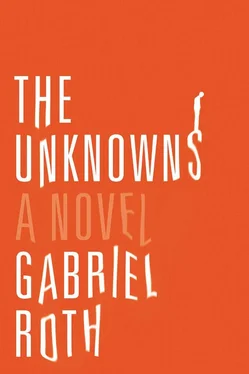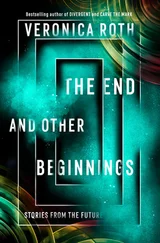Maya gives me a go-ahead nod, and Rebecca Grady, demonstrating that there is more to life than failure and humiliation, slips over to the buffet table to refill her wine and dip a baby carrot in hummus. I almost thank her.
“I was set to go to college,” I say. “I’d been accepted by Stanford. And then my dad lost all his money and there was no way my mom could pay the tuition. So I got a job doing computer stuff, and I was going to apply to the University of Colorado, and then my friend Bill asked me to come out here and do a startup with him.”
“Damn,” she says. “That’s great.” I’m not sure what part of it is great; I suspect she means that it’s more interesting than she had anticipated.
“So what about you?” I say. “Where did you go to college?”
“No, we’re not switching back to me yet,” she says, and I feel like I’ve caught an eighty-yard pass on national television. “What does your startup do?”
“We built a web service to track and synthesize people’s buying habits,” I say, “and then we sold it to a bigger company so they could run it into the ground.”
“And what was your role?”
“I designed the interface,” I say. “I built some of the back end, too. Are we switching back to you yet?”
“Not yet. How did your father lose his money?”
“He started a stupid business and put everything he had into it and burned through it in about two years.”
“Were you worried about the same thing happening to you?”
Terrified . “I tried to learn from his mistakes. We did everything as cheaply as possible. No company cafeteria and no pinball machines and no advertising budget. And we spent other people’s money.”
“Smart!”
“Thank you. We are now officially done with me and moving on to you. Do you like being a reporter?”
“Yeah, basically. I mean, day to day I hate it, it’s one heartbreak after another, but it’s the right thing for me to be doing. I like asking questions.”
“I’d never have guessed.” Look! I am teasing her affectionately !
“I like getting to the bottom of stuff. It’s just my nature.”
Probably time to pull out before I mess up somehow; I’m almost in a position to ask for her email address, even without a pretext. And then I feel a dark shadow across my soul, and before I have consciously registered any specific sensory evidence I am aware that someone is approaching from behind me and that this person’s presence is a very, very bad thing. And then I’m turning fifteen degrees to the right, and my smile freezes into a terrified rictus, and there is Lauren.
She’s still dressed as if for work, even though it’s Sunday. We all say polite things to one another, and Lauren and I ask each other how it’s going as though we had an interest in each other’s lives, but there’s no sign she’s any happier to see me than vice versa. I wish Cynthia and I had a special signal transmitter where I’d push a button and she’d hurry over and say We really need to get out of here if we’re going to get to that other thing on time . The task now is to find out how much information has passed from the girl on the right, with whom I have disgraced myself, to the girl on the left, with whom I am in love.
“So how do you guys know each other?” I say as casually as I can manage, i.e., not very.
“We went to college together,” Lauren says.
“Lauren was my WPC,” says Maya, smiling. “That’s women’s peer counselor .”
“See, this is the stuff I missed out on,” I say to Maya, picking up a thread from earlier and thus exiling Lauren to the conversational margins. “I never had a WPC.”
“What, because you’re a man?” Lauren asks.
“Uh, no, because I didn’t go to college,” I say. “I have a whole list of things people talk about that I don’t get. The dining hall is one. Also something called discussion sections , for which no one has ever done the reading.”
“It seems like you have a pretty good sense of it,” Maya says. “You didn’t miss much.”
“Really? You wouldn’t say My college years were the best years of my life , or God I miss having all that time just to read and hang out and do theater ? Because lots of people say stuff like that.”
“I would basically say that,” says Lauren. “If I didn’t think it might sound insensitive.”
“Mine wasn’t really like that,” Maya says, and Lauren’s face shows a sudden flush of sympathy. I get the impression I’m not supposed to ask, so I don’t.
“I think we’ve got to get out of here,” I say, gesturing at Cynthia on the other side of the hall. A thin woman in suit trousers is giving her a tour of the exhibits. “But, hey, great to see you again.” I throw this out to the pair of them, let them take what they want from it, and head over to grab Cynthia like a life raft.
When I get home, the two kids from the high school are sheltering in the doorway of my building. They wear the kind of sports gear that is never worn for athletic activity and sit on the stoop, him reclining against her chest. In the way of teenagers, they are strange-looking. She has olive skin and a widow’s peak, and the blue rubber bands in her braces make her mouth look like a marionette’s. His cheeks are carpeted with gemlike pustules. They spend their afternoons sitting in the doorway in the rapture of adolescent love.
Inside, it takes less than a minute to find her paper’s website, and from there to discover that her last name is Marcom: glamorously alliterative, like Greta Garbo or Lois Lane. Her stories fall into the investigative genre she described and speak in the reflexively cynical voice of the alternative press. My whole life I’ve ignored city politics, the province of idealists and racketeers, and as I survey Maya Marcom’s work my inattention seems juvenile, unserious, a failure of citizenship. I consider reading her entire oeuvre and constructing a list of questions for use during future conversations, but that would be too much. Instead I scan the archive for something intimate, an unjustified opinion or a sentence in the first person, but whether from heavy editing or an instinct for privacy her prose is an impersonal fortress of elegantly presented research. At the bottom of each article is a link to her email address at the paper, which I protectively store in my mail client’s address book.
I leave it there until Tuesday evening, when I should be preparing for dinner with my father. I’m wearing my most obviously expensive shirt, made of silk so slick and luminous it looks like a cliché. Since I last saw my father I have purchased an adult wardrobe, and I want him to know this, but some archaic guilt or fear has me frozen in front of the mirror reconsidering the shirt. To escape this loop I turn to my laptop, which is sitting on my bed, its weight causing a sinkhole in the duvet. This is the time to write her. Emailing the day after our conversation would have been too eager, obviously, but waiting three days would suggest too sustained an interest.
We’d just finished with me, but we were interrupted before we got to you . Refers to a shared joke; alludes gently to the Lauren embarrassment; invites a response. Please now tell me three things I don’t know and wouldn’t guess about you . Gimmicky, sure, but that’s the point: the obviousness of the gambit, the absence of any pseudoplatonic justification for contacting her — these convey boldness, decisiveness, as though I’m in possession of a natural confidence that obviates the need for ruses and stratagems. If she’s not interested, she won’t respond, which would be disappointing but not humiliating, and disappointment is within my risk-tolerance profile. I have no idea how anyone managed to have sex before email. I hit Command+Shift+D and cast this latest plea for affection out into the world, and then I finish buttoning my expensive shirt and call a cab to take me to meet my father.
Читать дальше












